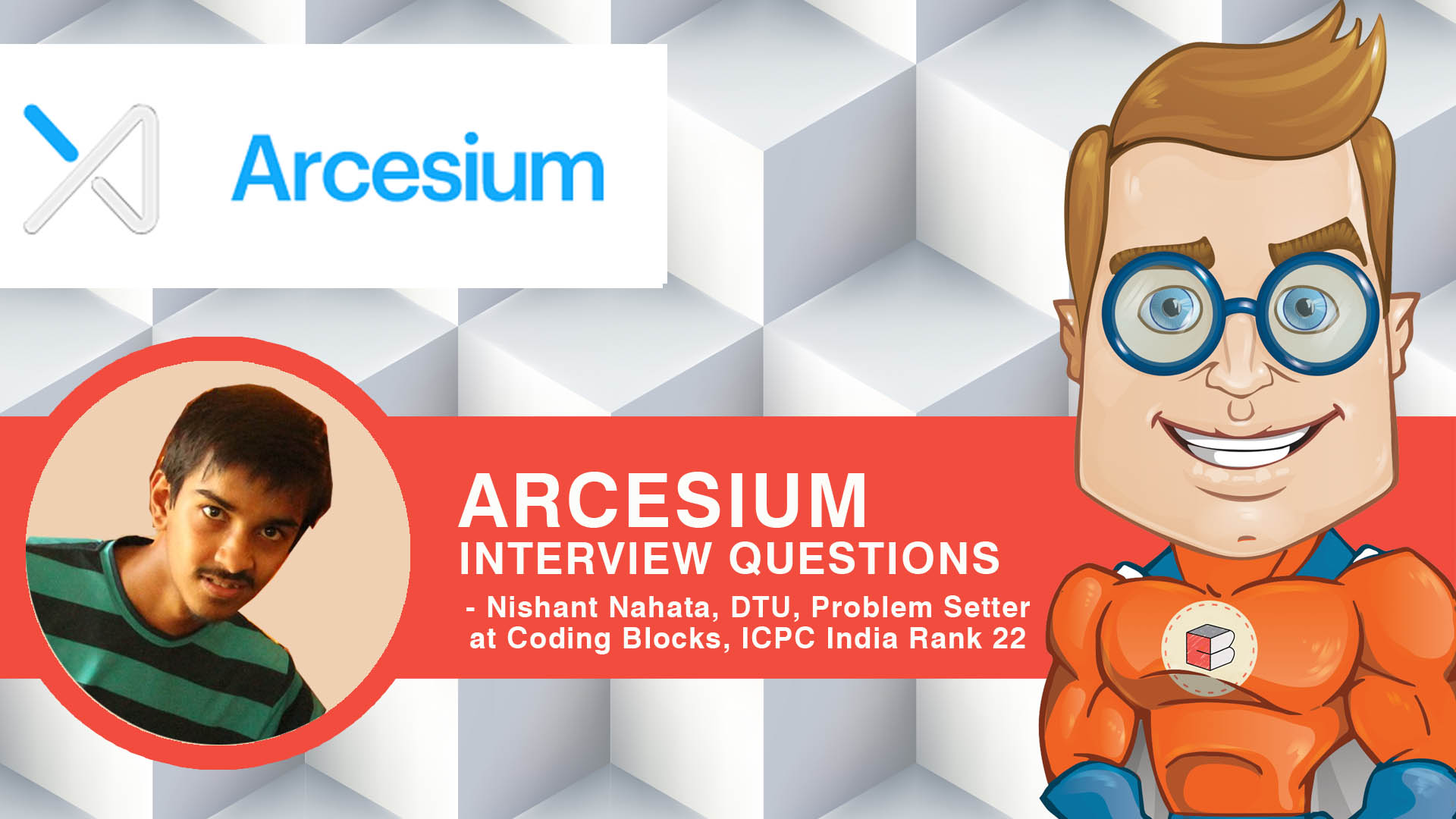Arcesium's Grilling Interview, for highest paid internship - Nishant Nahata's Experience

Recently, Arcesium visited DTU campus as the first company for its recruitment drive.We Congratulate Nishant Nahata for cracking the first company, and thank him for sharing his interview experiences with the student community.
Profile Overview:
Position : Software Dev Intern, 2 months
Location : Arcesium,Hyderadabad
Stipend : 1 lac per month
Other Benefits : Company Food + Travel + Accomodation
PRELIMINARY ROUND
Selection Procedure
The selection procedure comprised of 1 online round and 3 interviews. Cutoff **GPA was 8.45.
ONLINE ROUND:
Online round was on HackerRank. There were 3 sections :
Aptitude Round - 15 MCQs and 20 mins.
OS, DBMS, OOPS Round - 10 MCQs and 15 mins.
Coding round - 2 coding questions(mentioned below).
Q1. You are given an array of n integers. You need to insert these elements into 2 binary search trees(BSTs), such that maximum(height(BST-1), height(BST-2)) could be minimized. Elements can be inserted into BST in any order. (Constraints - 1<=n<=10^5)
Q2. Each letter, a-z, is assigned values in the following way: a: 1, b: 2, …, z: 26. You are given string, S, consisting of lowercase English letters and an integer, K. Find the lexicographically minimal string, whose sum is equal to K. (O(n^2) will work)
FIRST INTERVIEW:
Questions were mainly from resume and some algorithm based questions. I mentioned Django in my resume, so they asked me questions regarding database handling in Django framework. They asked some normal questions, like,
Q1: What do you rate yourself in programming on the scale of 5?
Q2: What are your favorite subjects(apart from algorithms and data structures)?
Q3: How much do you code in a day?
Q4: Why did you switch from Ruby on rails framework to Django framework(I wrote both of them in my CV)?
Q5: How was your experience of ICPC(Inter Collegiate Programming Contest)?
Q6: Show us the questions you have designed for HackerBlocks, as I had written problem setter intern at Coding Blocks in my CV. The interview checked the questions of HackerBlocks - Blocks of Code July Challenge and gave a compliment.
CODING QUESTIONS ASKED:
Q1: You are given an array, A, of n integers. Find the number of ordered pair (i,j), 1<=i,j<=n, such that the sum of A[i]+A[j]=x. (Constraints - 1<=n<=10^5, 1<=A[i], x<=10^9)
Q2: You are given an array, A, of n integers. Find a subarray whose sum is equal to a given number, K. (Constraints - 1<=n<=10^5, 1<=A[i], K<=10^9)
SECOND INTERVIEW:
Questions were from OOPS, one problem(Algorithm design), and related to what i have been doing in programming since i started. They asked me about mu journey in programming. I mentioned problemsetting in my CV, so they opened one of my problems and read it. They asked me about how i have been creating testcases for problems, so i told them my algorithms for creating testcases. OOPS questions were:
Q1: What is polymorphism?
Q2: What is difference between runtime polymorphism and compile-time polymorphism?
Q3: Function overloading and overriding.
Q4: Function overloading is compile time or runtime polymorphism?
Q5: Function overriding is compile time or runtime polymorphism?
Q6: Algorithm Design Problem
You are creating a weather app, and you have weather details of n locations. If a person searches for weather of his location, you need to find the nearest location, for which you have weather data.(Design your own algorithm)
THIRD INTERVIEW
Questions were from DBMS, OS, Algorithms
Q1: What is execve() system call?
Q2: What is thrashing?
Q3: How can we use multithreading to find a spanning tree of a graph more efficiently.
Q4: Disjoint-set Union(DSU) used in Kruskal Algorithm for finding Minimum Spanning Tree(MST).
Q5: SQL query related to Joins.(I told them that i dont know syntax, but i can think of a way to do such query).
Q6: SQL query related to GroupBy and difference between “having” and “where” in SQL.
Q7: Why do we use B+ Trees over Binary Search Trees in dbms?
Few stats
Online round was given by 100 students. They shortlisted 14 from it, and then 10 from Ist interview, 4 from the 2nd interview, and finally they selected 2 after taking 3rd interviews. I think interaction with interviewer and strong algorithmic concepts are important factor for selection. Try to discuss algorithms and approaches with the interviewer. Procedure is quite lengthy, but worth it.
Coding Blocks Review
The interview was quite grilling and required indepth knowledge. Arcesium conducted the whole process as they were 1th company on DTU Campus and wanted to pick the best minds. Also the company is packing hefty work stipend, the difficulty level of interview is justified.
Nishant is very good coder, developer and logical thinker. He is also the problem setter for Hackerblocks for Coding Blocks, and his team has secured a rank of AIR 22 in ACM-ICPC India Regionals 2015.We wish him all the best for his internship next year.